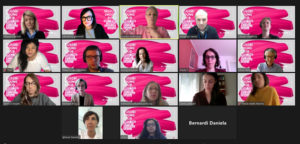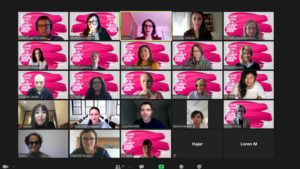an article by E. Giannotti, P. Clauser, D. Leithner, M.A. Marino, T. van Nijnattten, M. Wielema and F.J. Gilbert
Once more due to the global COVID-19 pandemic, the annual European Congress of Radiology was held entirely online. Therefore the EUSOBI YOUNG CLUB (EYC) decided to transform the popular EUSOBI Meet the Expert session into a successful online “Meet the Expert – Breakfast Edition”. With daily delicious breakfast recipes, we all had a fresh start of the day at the virtual EYC meeting.
Small groups of attendees discussed with a group of breast experts several different topics every day, enjoying the opportunity to directly ask questions in an informal setting. From Wednesday until Saturday morning, at 9 am CET, interesting conversations took place between enthusiastic experts, EYC Committee members and attendees from all over the world: UK, Germany, Italy, Sweden, France, Belgium, the Netherlands, Spain, Slovenia, Switzerland, USA, Russia, Saudi Arabia, Egypt, South Africa, India, Syria, Japan and even a four-legged friend joined the meeting.
One hot topic was the differences in screening programmes across the globe and the underlying rationale. Nowadays, nationwide screening programmes are not ubiquitously available. For instance, in India there is an opportunistic system where private clinics offer annual check-up but this is mainly in the wealthy healthy region of the country. In Russia, on the other hand, a nationwide screening programme is under development and one of the attendees shared her experiences in developing and implementing a nationwide Russian screening programme as part of her PhD.
Different diseases have different distributions around the world; lately, breast radiologists in India encountered a remarkably large number of granulomatous mastitis. One of the reasons for this finding might be that Sars-COV2 infection results in reactivation of latent tuberculosis. TB is known to be endemic in some African and Asian countries, such as India and Pakistan; Endemic TB is likely to be correlated with increasing numbers of granulomatous mastitis. This is something to consider in European countries also, especially in women who have moved from Africa or Asia.
Another COVID-19 related hot topic is the risk of developing enlarged ipsilateral axillary nodes after a Sars-COV2 vaccine and how to schedule the mammogram accordingly. Enlarged axillary lymph nodes can be reactive in nature as natural response to infection/inflammation but also a sign of breast cancer. Large scale COVID-19 vaccination began in December 2020 and the Drug Safety Unit in US has advised that breast screening appointments should be scheduled to take place before women receive a first dose of the vaccine or 4/ 6 weeks after the second dose where possible especially if this does not unduly delay care. This is due to the potential reaction of enlarged lymph nodes on the side of the vaccination.
The frequency of enlarged lymph nodes is variable with different vaccines (data today available from clinical trial: clinical palpable nodes Astra Zeneca and Pfizer <2%, Moderna 16%), but the number of asymptomatic enlarged nodes visible on mammography is expected to be higher and different countries have at the moment different approaches.
The news has been picked up by the press. It is very likely that this will raise concern in women with the unintended risk of women not attending their screening appointment. Consequently, it is important that Radiological Societies and National Screening Programmes address the issue.
The English NHSBSP does not recommend advising women to wait for a period of time following a COVID-19 vaccination before attending a screening appointment and continues the screening programme as usual. This is due to the 9-12 week gap between the first and second dose, increasing the time interval from the previous screen and the concern of non attendance at screening or vaccination.
The presence of enlarged axillary lymph nodes in a screening mammogram requires the woman to be recalled and at the time of assessment COVID-19 vaccination status, timing of injection, type and side should be documented.
During the Meet the Expert sessions advice from experts in the academic field was shared on how to start a research career or a project, and how to get your paper published. There was consensus that it starts with working with other radiological and clinical colleagues, reviewing the literature and identifying a topic of interest. The multidisciplinary meeting was felt to be the perfect environment for inspiration for research projects with clinical relevance. Novices might consider starting with retrospective studies or a literature review article. When the research is ready to be published, the audience and target of the journal should be considered, while keeping in mind its Impact Factor. If a paper is rejected, there is no need to despair – disappointment yes, but then a renewed effort to submit to another journal! Experts encouraged using the hopefully critical and constructive reviews as an opportunity to refine the paper and grow as a researcher. One area for individual growth was to learn how to review papers for a journal and work as a reviewer.
One of the hot topics at present is Artificial Intelligence (AI) and its implementation in breast imaging. Breast radiologists should not be afraid of AI, but embrace it instead. In the future, AI will definitely change the role for breast radiologists, improving reading time, quality and ultimately patient outcomes and experiences. Breast imagers could have more time and resources available to focus on an increasingly personalised approach of screening, diagnosis, prognosis and prediction. AI will enhance our role in patient care by allowing a more patient-tailored approach moving towards the ultimate goal of precision medicine in breast cancer.
Every expert provided three top tips for the next generation of breast imagers that you can find here: https://www.eusobi.org/content-eusobi/uploads/EYC_Meet-the-expert-2021_3TopTips.pdf
On a final note: two of the EUSOBI experts, current President Prof. Fiona J. Gilbert and former President Prof. Francesco Sardanelli, received this year the Gold Medal “from the hands” of the ECR President, and EUSOBI board member Prof. Michael Fuchsjäger. In their speeches they addressed the exciting future and challenges that young radiologists will face in their career.
Defying the obstacles of the COVID 19 pandemic experts and EYC members alike are looking forward to repeating this successful virtual event for the annual EUSOBI scientific meeting in Fall 2021 and continue to build bridges, hopefully in the much loved live event in Vienna 2022.


